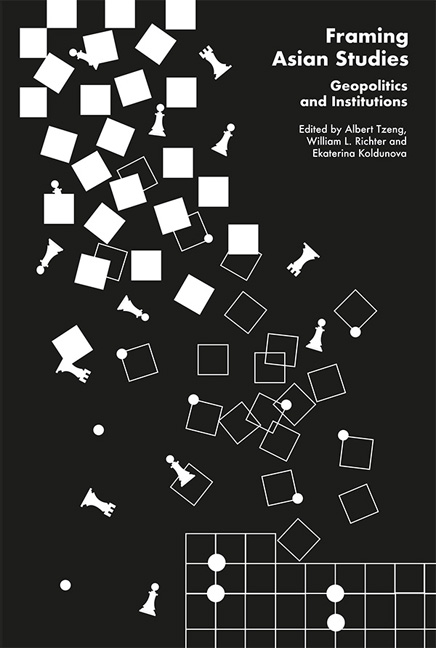Book contents
- Frontmatter
- Contents
- Foreword
- The Contributors
- 1 Introduction: Framing Asian Studies
- I Contested “Asia”
- II Geopolitical Framing of Western Discourse
- III Asian Studies in Former Soviet States
- IV Inter-Asian Gazes
- 10 Indian Understandings of Asia
- 11 South Seas Chinese in Colonial Classifications
- 12 Chinese Studies in Japan and South Korea: Geopolitics, Local Embeddedness and Knowledge
- Index
10 - Indian Understandings of Asia
from IV - Inter-Asian Gazes
Published online by Cambridge University Press: 28 June 2018
- Frontmatter
- Contents
- Foreword
- The Contributors
- 1 Introduction: Framing Asian Studies
- I Contested “Asia”
- II Geopolitical Framing of Western Discourse
- III Asian Studies in Former Soviet States
- IV Inter-Asian Gazes
- 10 Indian Understandings of Asia
- 11 South Seas Chinese in Colonial Classifications
- 12 Chinese Studies in Japan and South Korea: Geopolitics, Local Embeddedness and Knowledge
- Index
Summary
Modern Indian academic interest in East Asia has a multilayered context. Historical connections built through the movement of ideas and material objects were decisively reshaped during the colonial period so that these earlier linkages were always in tension with the colonial construction of the “East”. These ways of understanding created tensions and ambiguities in Indian engagement with countries in East and Southeast Asia. The writing of India's past was an enterprise carried out under British supervision, but also in resistance to it. In this enterprise, India's historical relationship with Asia played an important role in highlighting the unique qualities of Indian civilization — ideas that continue to shape contemporary thinking and, perhaps, account for the lack of an “Asian” boom in Indian intellectual circles.
India has yet to witness studies of Japan or China comparable to what has occurred in Europe, the United States and many other countries. That is not to say that Asian countries have not been studied, or that there is no sustained engagement with these countries. Rather, it is to suggest that this “past” has been marginalized or forgotten, and recovering this history provides a way of relocating India as part of a larger regional community. In this chapter I argue that Indian “understandings of Asia” have a different and layered history, and exploring these provides a way of thinking about knowledge production and its relationship to both civil society and the state.
I begin the chapter by first discussing the idea of Asia and the historical development of modern Indian conceptions of Asia. I look at four defining moments. The first is the pre-modern basis for Indian engagement, which began to change sometime in the early eighteenth century. The second came during the late nineteenth and early decades of the twentieth centuries when Indian intellectuals engaged directly with China, Japan and other parts of the Asian region. This first modern engagement, often in colonial capitals, grew out of the anticolonial struggle and resistance to Western intellectual domination, where the idea of “community” was on resistance. In fact, often India was projected as the core element of “Asia”. The third moment was in the year of independence, the Asian Relations Conference held in New Delhi. This could be called an “Afro-Asian” moment, for it built on the idea of resistance that included not only geographical Asia but all the former colonized territories.
- Type
- Chapter
- Information
- Framing Asian StudiesGeopolitics and Institutions, pp. 211 - 230Publisher: ISEAS–Yusof Ishak InstitutePrint publication year: 2018

